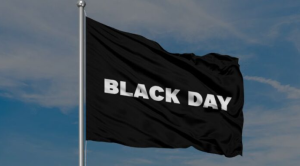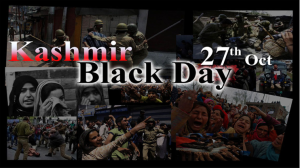Black Days Definition
“Black Day” can refer to a day marked by a tragic or significant historical event. For example, Black Tuesday (October 29, 1929) is associated with the Wall Street Crash and the start of the Great Depression.
Awareness campaigns:
Certain days may be designated as “Black Days” to address specific issues or causes, often related to social, environmental, or political concerns.
Cultural Festivals:
Some cultures informally celebrate “Black Day” by wearing black clothing or participating in specific activities. For instance, in South Korea, they informally recognize April 14 as “Black Day,” where singles who did not receive gifts on Valentine’s Day or White Day gather and eat black noodles.
National or regional festivals:
Some countries or regions may have specific “dark days” associated with historical or cultural events. These can vary widely in importance and meaning.
Here is a list of some notable “Black Days” from around the world:
Black Friday (USA):
It is not Memorial Day but an informal term for the day after Thanksgiving, which marks the beginning of the Christmas shopping season. It is known for massive sales and sometimes chaotic shopping scenes.
Black Week (Australia):
Refers to the devastating bushfires in the Australian state of Victoria on 7 February 2009, which resulted in widespread destruction and loss of life.
Black Tuesday (USA):
October 29, 1929, the day of the Wall Street Crash, which led to the Great Depression. It is considered one of the darkest days in the history of the US stock market.
Black July (Sri Lanka):
This refers to the anti-Tamil riots of July 1983, which resulted in significant violence and displacement of Tamil communities in Sri Lanka.
Black Wednesday (UK):
September 16, 1992, when the British government withdraws the pound from the European exchange rate mechanism, resulting in a financial crisis.
Black Week (Lebanon):
On May 7, 2008, heavy fighting broke out between Hezbollah and the Lebanese government, leading to a brief but intense conflict.
Black January (Azerbaijan):
January 20, 1990, when Soviet forces entered Baku to suppress the Azerbaijani independence movement, resulting in civilian casualties.
Black April (Vietnam):
Refers to the fall of Saigon on April 30, 1975, marking the end of the Vietnam War and the reunification of North and South Vietnam under Communist control.
Black Ribbon Day (Baltic States):
The signing of the Molotov-Ribbentrop Pact on August 23, 1939, resulted in the accession of the Baltic States to the Soviet Union.
Black Day (South Korea):
April 14, an unofficial event where singles wear black and gather on Valentine’s Day and White Day to protest social pressure on couples.
Understanding Kashmir Black Day
Introduction: Kashmir Black Day is observed every year on October 27, marking the 1947 invasion of Jammu and Kashmir by Pakistani tribal militias. The day serves as a reminder of the complex and enduring Kashmir conflict, which has been a source of tension between India and India. And Pakistan for many decades.
Historical Background
Partition and Accession: The Kashmir conflict has its roots in the partition of British India in 1947. The ruler of the princely state, Maharaja Hari Singh, had to decide whether to join India or Pakistan, as the princely states were given the option. Jammu and Kashmir faced a challenging decision. Fearing possible unrest, he chose to accede to India, which resulted in the deployment of Indian troops to defend the region.
Invasion by Tribal Militias: In opposition to the accession of the princely state to India, tribal militias supported by Pakistan launched an invasion on 22 October 1947, starting the First Indo-Pakistani War. The conflict escalated as both countries tried to gain control over the strategically important region.
II United Nations Intervention: A. Armistice and Line of Control: In response to the escalating conflict, the United Nations brokered an armistice in December 1948, establishing the Line of Control that divided the region between India and Pakistan. Management is divided into sections. However, this ceasefire did not lead to a lasting solution.
United Nations Resolutions and Referendum: The United Nations has passed several resolutions calling for a referendum to determine its political future in Jammu and Kashmir. However, India and Pakistan have not held the referendum, leaving the situation as a contentious issue
III Ongoing Conflict and Human Rights Concerns
Militarism and Insurgency: Over the years, the Kashmir conflict has seen periods of insurgency and militancy, with various groups advocating independence or integration with Pakistan. This led to a protracted conflict, resulting in a heavy military presence and human rights concerns.
International involvement: The international community has been expressing concern over the situation in Kashmir from time to time. However, achieving a comprehensive solution to the problems at hand is still challenging.
IV Impact on the People of Kashmir: A. Humanitarian Crisis: The ongoing conflict has had a profound impact on the people of Jammu and Kashmir. The region faces a humanitarian crisis, with reports of displacement, violence, and restrictions on basic rights.
- Desires for Peace: Despite the challenges, there are voices in the region that call for peace, reconciliation, and conflict resolution. The aspirations of the Kashmiri people for a safe and prosperous future deserve international attention.
- Diplomatic initiatives: Efforts for a diplomatic solution between India and Pakistan are important. International organizations, including the United Nations, can play an important role in facilitating discussions and negotiations to resolve underlying issues.
- Humanitarian Assistance and Rights: The international community should address humanitarian concerns in Kashmir, promote human rights, and ensure the well-being of residents who have borne the brunt of the conflict.
FAQs on Black Days
What does Black Day commemorate?
Black days commemorate historical events, tragedies, or significant events with a somber tone.
Does the world celebrate Black Day?
No, different countries and communities vary with the determination of specific days.
How is Black Day celebrated?
Events may include memorial services, awareness campaigns, moments of silence, or educational activities.
Can dark days have positive aspects?
Yes, they provide opportunities for reflection, education, and mobilization for positive change.
Is Black Day a public holiday?
No, Black Day is not a public day.
What is the origin of the term “Black Day”?
The term is symbolic, representing dark or difficult periods in history.
Do dark days always commemorate negative events?
While often associated with tragedy, some commemorate difficult situations such as the financial crisis.
How are dark days different from each other?
They differ in historical context, nature of events, and cultural or regional significance.
Can dark days lead to positive change?
Yes, raising awareness can promote efforts to prevent similar incidents, promote peace, or solve social problems.
How can people participate in Black Day celebrations?
Participation may include attending events, self-education, social media sharing, or engaging in activities that promote awareness and reflection.
